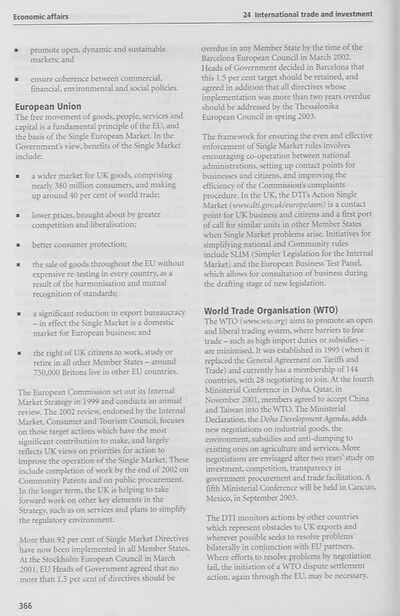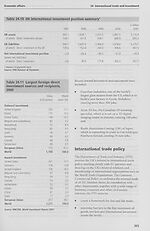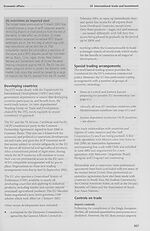Download files
Complete book:
Individual page:
Thumbnail gallery: Grid view | List view

Economic affairs
24 International trade and investment
■ promote open, dynamic and sustainable
markets; and
■ ensure coherence between commercial,
financial, environmental and social policies.
European Union
The free movement of goods, people, services and
capital is a fundamental principle of the EU, and
the basis of the Single European Market. In the
Government’s view, benefits of the Single Market
include;
■ a wider market for UK goods, comprising
nearly 380 million consumers, and making
up around 40 per cent of world trade;
■ lower prices, brought about by greater
competition and liberalisation;
■ better consumer protection;
■ the sale of goods throughout the EU without
expensh e re-testing in every country, as a
result of the harmonisation and mutual
recognition of standards;
■ a significant reduction in export bureaucracy
- in effect the Single Market is a domestic
market for European business; and
■ the right of ETC citizens to work, study or
retire in all other Member States - around
750,000 Britons live in other EU countries.
The European Commission set out its Internal
Market Strategy in 1999 and conducts an annual
review. The 2002 review, endorsed by the Internal
Market, Consumer and Tourism Council, focuses
on those target actions which have the most
significant contribution to make, and largely
reflects UK views on priorities for action to
improve the operation of the Single Market. These
include completion of work by the end of 2002 on
Community' Patents and on public procurement.
In the longer term, the UK is helping to take
forward work on other key elements in the
Strategy, such as on services and plans to simplify
the regulatory environment.
More than 92 per cent of Single Market Directives
have now been implemented in all Member States.
At the Stockholm European Council in March
2001, EU Heads of Government agreed that no
more than 1.5 per cent of directives should be
overdue in anv Member State by the time of the
Barcelona European Council in March 2002.
Heads of Government decided in Barcelona that
this 1.5 per cent target should be retained, and
agreed in addition that all directives whose
implementation was more than two years overdue
should be addressed by the Thessalonika
European Council in spring 2003.
The framework for ensuring the even and effective
enforcement of Single Market rules involves
encouraging co-operation between national
administrations, setting up contact points for
businesses and citizens, and improving the
efficiencv of the Commission's complaints
procedure. In the UK, the DTI s Action Single
Market f intw.dfi.gov. uk/europe/asm) is a contact
point for UK business and citizens and a first port
of call for similar units in other Member States
when Single Market problems arise. Initiatives for
simplifving national and Community rules
include SLIM (Simpler Legislation for the Internal
Market) and the European Business Test Panel,
which allows for consultation of business during
the drafting stage of new legislation.
World Trade Organisation (WTO)
The WTO {www.wto.org) aims to promote an open
and liberal trading system, where barriers to free
trade - such as high import duties or subsidies -
are minimised. It was established in 1995 (when it
replaced the General Agreement on Tariffs and
Trade) and currently has a membership of 144
countries, with 28 negotiating to join. At the fourth
Ministerial Conference in Doha, Qatar, in
November 2001, members agreed to accept China
and Taiwan into the WTO. The Ministerial
Declaration, the Doha Development Agenda, adds
new negotiations on industrial goods, the
environment, subsidies and anti-dumping to
existing ones on agriculture and services. More
negotiations are envisaged after two years’ study on
imestment, competition, transparency in
government procurement and trade facilitation. A
fifth Ministerial Conference will be held in Cancun,
Mexico, in September 2003.
The DTI monitors actions by other countries
which represent obstacles to UK expxuts and
wherever possible seeks to resolve problems
bilaterallv in conjunction with EU p»artners.
Where efforts to resobe problems by negotiation
fail, the initiation of a WTO dispute settlement
action, again through the EU, may be necessary.
366
24 International trade and investment
■ promote open, dynamic and sustainable
markets; and
■ ensure coherence between commercial,
financial, environmental and social policies.
European Union
The free movement of goods, people, services and
capital is a fundamental principle of the EU, and
the basis of the Single European Market. In the
Government’s view, benefits of the Single Market
include;
■ a wider market for UK goods, comprising
nearly 380 million consumers, and making
up around 40 per cent of world trade;
■ lower prices, brought about by greater
competition and liberalisation;
■ better consumer protection;
■ the sale of goods throughout the EU without
expensh e re-testing in every country, as a
result of the harmonisation and mutual
recognition of standards;
■ a significant reduction in export bureaucracy
- in effect the Single Market is a domestic
market for European business; and
■ the right of ETC citizens to work, study or
retire in all other Member States - around
750,000 Britons live in other EU countries.
The European Commission set out its Internal
Market Strategy in 1999 and conducts an annual
review. The 2002 review, endorsed by the Internal
Market, Consumer and Tourism Council, focuses
on those target actions which have the most
significant contribution to make, and largely
reflects UK views on priorities for action to
improve the operation of the Single Market. These
include completion of work by the end of 2002 on
Community' Patents and on public procurement.
In the longer term, the UK is helping to take
forward work on other key elements in the
Strategy, such as on services and plans to simplify
the regulatory environment.
More than 92 per cent of Single Market Directives
have now been implemented in all Member States.
At the Stockholm European Council in March
2001, EU Heads of Government agreed that no
more than 1.5 per cent of directives should be
overdue in anv Member State by the time of the
Barcelona European Council in March 2002.
Heads of Government decided in Barcelona that
this 1.5 per cent target should be retained, and
agreed in addition that all directives whose
implementation was more than two years overdue
should be addressed by the Thessalonika
European Council in spring 2003.
The framework for ensuring the even and effective
enforcement of Single Market rules involves
encouraging co-operation between national
administrations, setting up contact points for
businesses and citizens, and improving the
efficiencv of the Commission's complaints
procedure. In the UK, the DTI s Action Single
Market f intw.dfi.gov. uk/europe/asm) is a contact
point for UK business and citizens and a first port
of call for similar units in other Member States
when Single Market problems arise. Initiatives for
simplifving national and Community rules
include SLIM (Simpler Legislation for the Internal
Market) and the European Business Test Panel,
which allows for consultation of business during
the drafting stage of new legislation.
World Trade Organisation (WTO)
The WTO {www.wto.org) aims to promote an open
and liberal trading system, where barriers to free
trade - such as high import duties or subsidies -
are minimised. It was established in 1995 (when it
replaced the General Agreement on Tariffs and
Trade) and currently has a membership of 144
countries, with 28 negotiating to join. At the fourth
Ministerial Conference in Doha, Qatar, in
November 2001, members agreed to accept China
and Taiwan into the WTO. The Ministerial
Declaration, the Doha Development Agenda, adds
new negotiations on industrial goods, the
environment, subsidies and anti-dumping to
existing ones on agriculture and services. More
negotiations are envisaged after two years’ study on
imestment, competition, transparency in
government procurement and trade facilitation. A
fifth Ministerial Conference will be held in Cancun,
Mexico, in September 2003.
The DTI monitors actions by other countries
which represent obstacles to UK expxuts and
wherever possible seeks to resolve problems
bilaterallv in conjunction with EU p»artners.
Where efforts to resobe problems by negotiation
fail, the initiation of a WTO dispute settlement
action, again through the EU, may be necessary.
366
Set display mode to:
![]() Universal Viewer |
Universal Viewer | ![]() Mirador |
Large image | Transcription
Mirador |
Large image | Transcription
The item on this page appears courtesy of Office for National Statistics and may be re-used under the Open Government Licence for Public Sector Information.
| Britain and UK handbooks > UK: The official yearbook of the United Kingdom of Great Britain and Northern Ireland > 2003 > (408) |
|---|
| Permanent URL | https://digital.nls.uk/204928414 |
|---|
| Attribution and copyright: |
|
|---|---|
| Description | Three volumes of 'UK: The official yearbook of the United Kingdom of Great Britain and Northern Ireland', published annually by the Office of National Statistics from 2002-2005. |
|---|---|
| Shelfmark | GII.11 SER |
| Description | Three titles produced by the British Government from 1954-2005 describing 'how Britain worked'. They are: 'Britain: An official handbook' (1954-1998), 'Britain: The official yearbook of the United Kingdom' (1999-2001), and 'UK: The official yearbook of the United Kingdom of Great Britain and Northern Ireland' (2002-2005). These 50 reports provide an overview of Britain's economic, social and cultural affairs, its environment, international relations, and the systems of government. They give an impartial summary of government policies and initiatives, and explain how public services are organised. |
|---|---|
| Additional NLS resources: |
|

